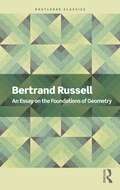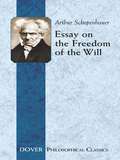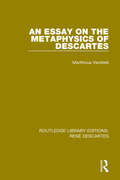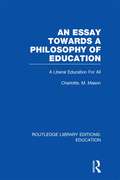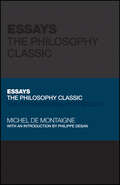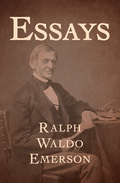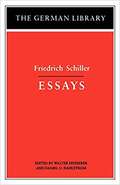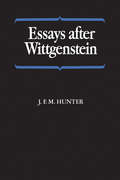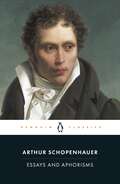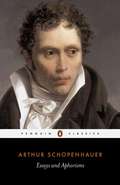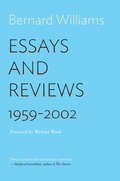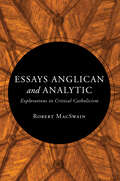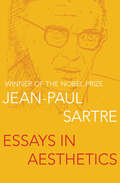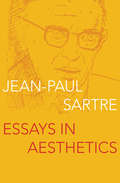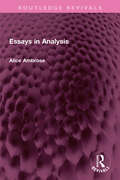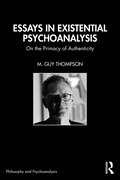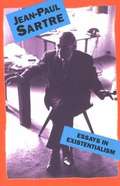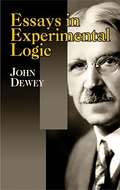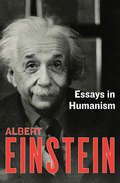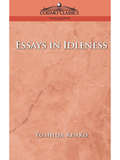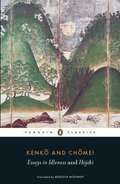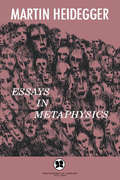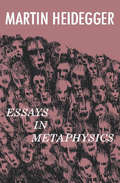- Table View
- List View
An Essay on the Foundations of Geometry (Routledge Classics)
by Bertrand RussellAn Essay on the Foundations of Geometry was first published in 1897 when Bertrand Russell was 25 years old. It marks his first major foray into analytic philosophy, a movement in which Russell is one of the founding members and figurehead. It provides a brilliant insight into Russell's early philosophical thought and an engaging and authoritative introduction to the philosophical and logical foundations of geometry - a version of which was fundamental to Einstein's theory of relativity. Russell explores and introduces the concepts of geometry and their philosophical implications, including a historical overview of geometrical theory, making it an invaluable resource not only for students of philosophy but anyone interested in the origins of the thought of one of the twentieth century's most important and widely-read philosophers. This Routledge Classics edition includes a new Foreword by Michael Potter.
Essay on the Freedom of the Will
by Arthur Schopenhauer Konstantin KolendaThe winning entry in a competition held by the Royal Norwegian Society of Sciences, Schopenhauer's 1839 essay brought its author international recognition. Its brilliant and elegant treatments of free will and determinism elevated it to a classic of Western philosophy, and its penetrating reflections still remain relevant.Schopenhauer makes a distinction between freedom of acting (which he endorses) and the freedom of willing (which he refutes). The philosopher regards human activity as entirely determined, but he also posits that the variety of freedom that cannot be established in the sphere of human activity resides at the level of individuated will -- a reality that transcends all dependency on outside factors. Because the essay's clear and rigorous argument reveals many basic features of his thought, it forms a useful introduction to Schopenhauer for students of philosophy or religion.
An Essay on the History of Civil Society
by Fania Oz-Salzberger Adam FergusonAdam Ferguson's Essay on the History of Civil Society (first published in 1767) is a classic of the Scottish--and European--Enlightenment. Drawing on such diverse sources as classical authors and contemporary travel literature, Ferguson combines a subtle analysis of modern commercial society with a critique of its abandonment of civic and communal virtues. Central themes in Ferguson's theory of citizenship are conflict, play, political participation and military valor. The Essay is a bold and novel attempt to reclaim the tradition of active citizenship in the modern state.
An Essay on the Metaphysics of Descartes (Routledge Library Editions: Rene Descartes #4)
by Marthinus VersfeldOriginally published in 1940, this book provides a thorough discussion of René Descartes philosophy of metaphysics, examining the three major points of the mind and body, freedom of the will and religion and science. Specific chapters are devoted to the Cartesian theory and the Meditations, in particular the Sixth.
An Essay Towards A Philosophy of Education: A Liberal Education for All (Routledge Library Editions: Education)
by Charlotte M MasonThis was the last and most important and comprehensive work of Charlotte Mason, (founder of the Parents’ National Educational Union). For more than half a century the practical results of her original thought on education could be seen in all parts of the world in the Charlotte Mason Method and the Parents’ Union Schools.
Essays: The Philosophy Classic (Capstone Classics)
by Michel De MontaigneAn essential companion to the most relevant works of Michel de Montaigne Essays: The Philosophy Classic delivers a carefully curated collection of thought-provoking works by sixteenth-century thinker Michel De Montaigne. Exploring topics as diverse as politics, poetry, love, friendship and the purpose of philosophy, this latest entry in the celebrated Capstone Classics series is accessible and intuitively organized. Follow the thoughts of the person who created the essay genre in literature as he expresses his philosophy, interests, and learning. Throughout, you’ll be guided by an expansive introduction by leading Montaigne scholar Philippe Desan and the comments of series editor Tom Butler-Bowdon, placing the work of Montaigne in its historical and philosophical context. You’ll also find: Celebrated and famous works by Montaigne, including noted classics like “That to Study Philosophy is to Learn to Die” Lesser-known works that have taken on increased importance in the unique context of the 21st-century A version of the popular Charles Cotton translation first published in 1685: a simple, faithful, and clear adaptation of the French originalAn invaluable resource for anyone interested in the insightful and illuminating work of one of the most enduring thinkers of the 16th-century, Essays: The Philosophy Classic is an essential addition to the libraries of philosophers, historians, and laypeople seeking an eye-opening and fascinating exploration of life itself.
Essays: Second Series. --
by Ralph Waldo EmersonThe major works of one of the nineteenth century&’s most influential philosophers In the early days of the American experiment, as the states spread across the continent and the young nation was reshaped by the Industrial Revolution, no intellectual held more power than Ralph Waldo Emerson. The leading light of the Transcendentalists, Emerson spent his life devising a uniquely American philosophy, a worldview as suited to the bustling docks of Boston as it is to the endless expanses of the West. Through lectures, letters, and essays, Emerson helped a nation discover its identity. In this collection, which includes such monumental essays as &“Nature,&” &“Self-Reliance,&” and &“The American Scholar,&” Emerson brilliantly articulates his philosophy of individualism and nonconformity. An inspiration to Henry David Thoreau, Walt Whitman, and countless other literary and political figures, Emerson exerted a profound influence that continues to be felt more than a century after his death. This ebook has been professionally proofread to ensure accuracy and readability on all devices.
Essays: Friedrich Schiller (German Library #Volume 15)
by Walter Hinderer Daniel O. DahlstromFriedrich Schiller, playwright and philosophical thinker best known for his immense influence on German literature. His his essays helped shape one of the most prolific periods of German philosophizing; since then, they have served as a significant source of philosophical insight from an aesthetic practitioner of the highest standing. (Stanford Encyclopedia of Philosophy )
The Essays: A Selection
by Michel De Montaigne M. A. ScreechTo overcome a crisis of melancholy after the death of his father, Montaigne withdrew to his country estates and began to write. In the highly original essays that resulted he discussed themes such as fathers and children, conscience and cowardice, coaches and cannibals, and, above all, himself. On Some Lines of Virgil opens out into a frank discussion of sexuality and makes a revolutionary case for the equality of the sexes. In On Experience Montaigne superbly propounds his thoughts on the right way to live, while other essays touch on issues of an age struggling with religious and intellectual strife, with France torn apart by civil war. These diverse subjects are united by Montaigne's distinctive voice - that of a tolerant man, sceptical, humane, often humorous and utterly honest in his pursuit of the truth. M. A. Screech's distinguished translation fully retains the light-hearted and inquiring nature of the essays. In his introduction, he examines Montaigne's life and times, and the remarkable self-portrait that emerges from his works.
Essays after Wittgenstein
by J.F.M. HunterWritten within the tradition of Wittgenstein's work, these eight original essays in philosophical psychology are either by-products of efforts to understand Wittgenstein's later writings or applications of techniques and approaches derived from Wittgenstein to problems about which he did not say a great deal. In much of his later writings, Wittgenstein was not so much trying to explain his own views as to tease, annoy, and confuse the reader into working our for himself solutions to some philosophical problems. Professor Hunter, goaded and guided by Wittgenstein, here presents in clear and plain prose the views that he has worked out on a number of different questions. Although the essays are not exegetical in form, they will be found by students of the great philosopher to contain a large number of novel suggestions as to how Wittgenstein might be interpreted; philosophers, psychologists, linguists, and mathematicians are offered an unconventional, interesting, and richly argued approach to some of the main problems in philosophical psychology. The essays treat Meaning, Telling, Pain, Logical Compulsion, Identity, Imagining, Dreaming, and Talking. One eminent scholar has predicted that this volume may reverse the present tendency of philosophers to follow the lead of Noam Chomsky in the philosophy of language.
Essays and Aphorisms
by Arthur SchopenhauerOne of the greatest philosophers of the nineteenth century, Schopenhauer (1788-1860) believed that human action is determined not by reason but by 'will' - the blind and irrational desire for physical existence. This selection of his writings on religion, ethics, politics, women, suicide, books and many other themes is taken from Schopenhauer's last work, Parerga and Paralipomena, which he published in 1851. These pieces depict humanity as locked in a struggle beyond good and evil, and each individual absolutely free within a Godless world, in which art, morality and self-awareness are our only salvation. This innovative - and pessimistic - view has proved powerfully influential upon philosophy and art, directly affecting the work of Nietzsche, Wittgenstein and Wagner among others.
Essays and Aphorisms
by Arthur Schopenhauer R. J. HollingdaleOne of the greatest philosophers of the nineteenth century, Schopenhauer (1788-1860) believed that human action is determined not by reason but by 'will' - the blind and irrational desire for physical existence. This selection of his writings on religion, ethics, politics, women, suicide, books and many other themes is taken from Schopenhauer's last work, Parerga and Paralipomena, which he published in 1851. These pieces depict humanity as locked in a struggle beyond good and evil, and each individual absolutely free within a Godless world, in which art, morality and self-awareness are our only salvation. This innovative - and pessimistic - view has proved powerfully influential upon philosophy and art, directly affecting the work of Nietzsche, Wittgenstein and Wagner among others.
Essays and Reviews: 1959–2002
by Bernard WilliamsThe first collection of popular reviews and essays from distinguished philosopher Bernard WilliamsBernard Williams was one of the most important philosophers of the past fifty years, but he was also a distinguished critic and essayist with an elegant style and a rare ability to communicate complex ideas to a wide public. This is the first collection of Williams's popular essays and reviews. Williams writes about a broad range of subjects, from philosophy to science, the humanities, economics, feminism, and pornography.Included are reviews of major books such as John Rawls’s Theory of Justice, Richard Rorty’s Consequences of Pragmatism, and Martha Nussbaum’s Therapy of Desire. But many of these essays extend beyond philosophy, providing an intellectual tour through the past half century, from C. S. Lewis to Noam Chomsky. No matter the subject, readers see a first-class mind grappling with landmark books in "real time," before critical consensus had formed and ossified.
Essays Anglican and Analytic: Explorations in Critical Catholicism
by Robert MacSwainExplore the riches at the intersection of Anglican and philosophical theology. In this thought-provoking essay collection, Robert MacSwain explores important connections between Anglican and philosophical theology. Shining a spotlight on the underappreciated theological work of Austin Farrer and David Brown, he brings them into creative conversation with better-known figures such as Joseph Butler, C. S. Lewis, Stanley Hauerwas, and Eleonore Stump. He skillfully leads readers through diverse conceptual territory ranging from the Reformed epistemology of Alvin Plantinga and Nicholas Wolterstorff, to the hiddenness argument of J. L. Schellenberg, to a sacramental vision of human culture and the arts. More broadly, MacSwain outlines what he calls &“Critical Catholicism,&” explaining how it differs from other movements in contemporary Christian thought such as Radical Orthodoxy and Analytic Theology. These perceptive essays will be of particular interest to scholars and pastors who are curious about connections between theology, philosophy, and Anglican studies.
Essays in Aesthetics
by Jean-Paul SartreRenowned French philosopher Jean-Paul Sartre references artists such as Tintoretto, Calder, Lapoujade, Titian, Raphael, and Michaelangelo in discussing how great art of the past relates to the challenges of his eraEssays in Aesthetics is a provocative collection that considers the nature of art and its meaning. Sartre considers the artist&’s &“function,&” and the relation of art and the artist to the human condition. Sartre integrates his deep concern for the sensibilities of the artist with a fascinating analysis of the techniques of the artist as creator. The result is a vibrant manifesto of existentialist aesthetics. By looking at existentialism through the lens of great art, Essays in Aesthetics is just as valuable a read to the artist as it is to the philosopher.
Essays in Aesthetics (Essay Index Reprint Ser.)
by Jean-Paul SartreRenowned French philosopher Jean-Paul Sartre references artists such as Tintoretto, Calder, Lapoujade, Titian, Raphael, and Michaelangelo in discussing how great art of the past relates to the challenges of his eraEssays in Aesthetics is a provocative collection that considers the nature of art and its meaning. Sartre considers the artist&’s &“function,&” and the relation of art and the artist to the human condition. Sartre integrates his deep concern for the sensibilities of the artist with a fascinating analysis of the techniques of the artist as creator. The result is a vibrant manifesto of existentialist aesthetics. By looking at existentialism through the lens of great art, Essays in Aesthetics is just as valuable a read to the artist as it is to the philosopher.
Essays in Analysis (Routledge Revivals)
by Alice AmbroseFirst published in English in 1966, Essays in Analysis addresses the problems in logic and foundations of mathematics, metaphysics, and epistemology. The problems are all root problems in their fields and range from questions concerning our knowledge of the external world to questions about logical entailment, mathematical proof, and induction. Their treatment is not guided by any underlying systematic view, as is characteristic in speculative philosophy. The unity and orientation of the collection are instead provided by the method employed throughout, the method of analysis. A central method of philosophy from Zeno to the present has been analysis of concepts, and the guiding idea throughout these essays is that analysis is the only means by which philosophers can bring clarification to their subject. The complaint has been made that clarity is not enough; but unless it is steadfastly pursued, obscurity and confusion are free to pass for profundity. As will be evident from even a cursory view reading of these studies, all are deeply influenced by Moore and Wittgenstein, with whom the author studied for some years at Cambridge university. This is an interesting read for scholars and researchers of philosophy.
Essays in Existential Psychoanalysis: On the Primacy of Authenticity (Philosophy and Psychoanalysis)
by M. Guy ThompsonIn this brilliant and revolutionary collection of 14 major essays that draw from more than 25 years of painstaking research, M. Guy Thompson regales us with a stunning revisioning of conventional psychoanalysis that deepens our understanding of the human condition. Integrating the most seminal existentialist philosophers, including Nietzsche, Heidegger, and Sartre, with the most forward-thinking psychoanalysts over the past century, including Freud, Laing, Bion, Winnicott, and Lacan, Thompson offers a profound yet deeply personal vision of what psychoanalysis can be in the 21st century. In this fascinating volume, Thompson explores such concepts as experience, authenticity, will, happiness, and agency by utilizing a wide range of thinkers, including the ancient Greeks, but always in his singular voice. Exquisitely lucid and engaging to read, Thompson deftly lures us into thoughtful and enlightening territory typically inaccessible to the general reader. This compelling integration of continental philosophy and psychoanalysis will be of interest not only to psychoanalytic practitioners of all persuasions, but to psychotherapists generally and their patients, as well as philosophers, social scientists, and any student of the human condition.
Essays In Existentialism
by Jean-Paul Sartre Wade BaskinExamination of human consciousness; philosophy, metaphysics, semantics, and existentialism by Jean-Paul Sartre.
Essays in Experimental Logic
by John DeweyThe scope of John Dewey's writings -- ranging from aesthetics and education to legal and political theory -- and his role in the development of twentieth-century philosophy have helped make him a continuing influence on contemporary thought. One of his most significant contributions to the theory of knowledge lay in his application of the principles of instrumentalism to traditional approaches to logical theory. Essays in Experimental Logic contains 14 of Dewey's most profound papers on many different aspects of knowledge, reality, and epistemology.These papers on experimental logic are based on the theory that possession of knowledge implies a judgment, resulting from an inquiry or investigation. The presence of this "inquiry stage" suggests an intermediate and mediating phase between the external world and knowledge, an area conditioned by other factors. Expanding upon this foundation, these papers consider the relationship of thought and its subject matter; the antecedents and stimuli of thought, data, and meanings; the objects of thought; control of ideas by facts; and similar topics.Three papers describe the various kinds of philosophical realism. The first closely examines Bertrand Russell's dictum concerning "our knowledge of the external world as a field for scientific method"; the other two discuss pragmatism, differentiating Dewey's position from those of James and Peirce. These essays present their author's most easily followed account of his own philosophy. The section entitled "Stage of Logical Thought" analyzes the role of scientific method in philosophy, and the final essay presents a striking theory of a logic of values.
Essays in Humanism
by Albert EinsteinThe great thinker reflects on such topics as nuclear weapons, world poverty, and international affairs in this Wall Street Journal bestseller. Nuclear proliferation, Zionism, and the global economy are just a few of the insightful and surprisingly prescient topics scientist Albert Einstein discusses in this volume of collected essays from between 1931 and 1950. Written with a clear voice and a thoughtful perspective on the effects of science, economics, and politics in daily life, Einstein&’s essays provide an intriguing view inside the mind of a genius addressing the philosophical challenges presented during the turbulence of the Great Depression, the Second World War, and the dawn of the Cold War.This authorized ebook features rare photos and never-before-seen documents from the Albert Einstein Archives at the Hebrew University of Jerusalem.
Essays in Idleness
by Yoshida KenkoYoshida Kenko's Essays in Idleness is a collection of his thoughts on his inner world and the world of Japanese life in the fourteenth century. He touched on topics as diverse as the benefits of the simple life ("There is indeed none but the complete hermit who leads a desirable life"), solitude ("I am happiest when I have nothing to distract me and I am completely alone"), lust ("What a weakly thing is this heart of ours"), the impermanence of this world ("Truly the beauty of life is its uncertainty"), and reading ("To sit alone in the lamplight with a book spread out before you, and hold intimate converse with men of unseen generations--such is a pleasure beyond compare"). To enter Kenko's world is to enter a world of intimate observations, deceptively simple wisdom, and surprising wit.
Essays in Idleness and Hojoki
by Yoshida Kenko Meredith Mckinney Kamo No ChomeiThese two works on life's fleeting pleasures are by Buddhist monks from medieval Japan, but each shows a different world-view. In the short memoir Hôjôki, Chômei recounts his decision to withdraw from worldly affairs and live as a hermit in a tiny hut in the mountains, contemplating the impermanence of human existence. Kenko, however, displays a fascination with more earthy matters in his collection of anecdotes, advice and observations. From ribald stories of drunken monks to aching nostalgia for the fading traditions of the Japanese court, Essays in Idleness is a constantly surprising work that ranges across the spectrum of human experience. Meredith McKinney's excellent new translation also includes notes and an introduction exploring the spiritual and historical background of the works. Chômei was born into a family of Shinto priests in around 1155, at at time when the stable world of the court was rapidly breaking up. He became an important though minor poet of his day, and at the age of fifty, withdrew from the world to become a tonsured monk. He died in around 1216. Kenkô was born around 1283 in Kyoto. He probably became a monk in his late twenties, and was also noted as a calligrapher. Today he is remembered for his wise and witty aphorisms, 'Essays in Idleness'.
Essays in Metaphysics
by Martin HeideggerThe two lectures translated here were published in 1957 under the title Identitat und Differenz. The sensitive and attentive reader will come away with a feeling that he now knows Heidegger, the man, the teacher, better. Heidegger provides illuminating insights and thoughts on many a vital issue--our technological age, religion, language, history, and more--all of which he touches upon here, if only epigrammatically. What makes Heidegger important is his receptiveness, his sensitivity, his ability to be at the heart of the problem and "see" and "hear" when others see and hear nothing.
Essays in Metaphysics: Identity and Difference
by Martin HeideggerThe two lectures translated here were published in 1957 under the title Identitat und Differenz. The sensitive and attentive reader will come away with a feeling that he now knows Heidegger, the man, the teacher, better. Heidegger provides illuminating insights and thoughts on many a vital issue—our technological age, religion, language, history, and more—all of which he touches upon here, if only epigrammatically. What makes Heidegger important is his receptiveness, his sensitivity, his ability to be at the heart of the problem and &“see&” and &“hear&” when others see and hear nothing.
